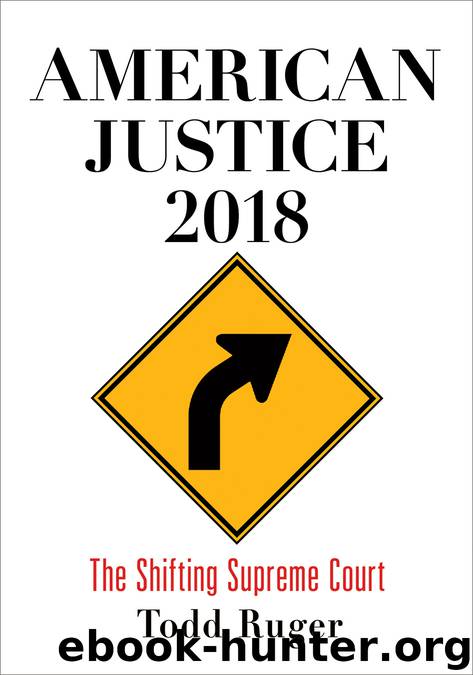American Justice 2018 by Todd Ruger

Author:Todd Ruger [Ruger, Todd]
Language: eng
Format: epub
ISBN: 9780812250855
Publisher: University of Pennsylvania Press, Inc.
Published: 2018-01-15T07:00:00+00:00
The Supreme Court could hardly avoid deciding such a high-profile case, and it was clear the justices would be seen as partisan by one side or the other. The divide was stark in the month after Trump created the original ban, with 89 percent of Democrats opposing it and 81 percent of Republicans supporting it, according to a Pew Research Center poll. Trump continued to drive a wedge between the two sides throughout the court battle over the case, in television interviews and on his Twitter account. He called the second and third versions of the ban “watered down” and “politically correct” versions. He alluded on Twitter to a fake story about Gen. John J. Pershing’s killing Muslim insurgents with bullets dipped in pig’s blood. He retweeted anti-Muslim videos.
Dozens of lawmakers, religious organizations, and civil rights groups urged the court to strike down the ban. The U.S. Conference of Catholic Bishops and other Catholic groups told the justices in a brief that such blatant religious discrimination is repugnant to the Catholic faith, core American values, and the Constitution, and “poses a substantial threat to religious liberty that this Court has never tolerated before and should not tolerate now.” A bipartisan group of more than fifty national security and foreign policy officials—including those who ran the CIA, represented America at the United Nations, served as secretaries at the Departments of Defense, State, and National Security, or led White House counterterrorism efforts—filed a brief that said the ban was a “radical departure” from prior border-security policy, was not supported by any intelligence, had no credible or compelling need, actually damaged national security, and was not “deserving of this Court’s deference.”
One of the briefs stood out for the first name listed on it—Karen Korematsu—who along with others told the justices that they need only look to the court’s own precedents “for a reminder of the constitutional costs and human suffering that flow from the Judiciary’s failure to rein in sweeping governmental action against disfavored minorities.”
Korematsu’s father, Fred, a welder living in Oakland, California, defied a World War II–era executive order from President Franklin Delano Roosevelt in 1942 that led to the removal and incarceration of all individuals of Japanese ancestry on the entire Pacific Coast. The government sent them to barracks in desolate areas dubbed “relocation centers” that were surrounded by barbed wire and machine-gun towers. A divided Supreme Court back then ultimately sided with the government, ruling that it would not substitute its judgment for that of the military authorities when it came to wartime policies. The justices allowed the concentration camps to remain.
In the decades following the Korematsu decision, the country’s lawmakers acknowledged the injustice of the program in a 1988 law that said it was based on “race prejudice, war hysteria, and a failure of political leadership,” and among other actions offered an official apology. The Supreme Court, however, had never overturned its ruling in the case.
And now Korematsu’s daughter highlighted the similarities between the government’s argument in 1942 and 2018.
Download
This site does not store any files on its server. We only index and link to content provided by other sites. Please contact the content providers to delete copyright contents if any and email us, we'll remove relevant links or contents immediately.
| Africa | Americas |
| Arctic & Antarctica | Asia |
| Australia & Oceania | Europe |
| Middle East | Russia |
| United States | World |
| Ancient Civilizations | Military |
| Historical Study & Educational Resources |
Cat's cradle by Kurt Vonnegut(15335)
Pimp by Iceberg Slim(14488)
4 3 2 1: A Novel by Paul Auster(12375)
Underground: A Human History of the Worlds Beneath Our Feet by Will Hunt(12090)
The Radium Girls by Kate Moore(12018)
Wiseguy by Nicholas Pileggi(5770)
The Fire Next Time by James Baldwin(5431)
Perfect Rhythm by Jae(5398)
American History Stories, Volume III (Yesterday's Classics) by Pratt Mara L(5300)
Paper Towns by Green John(5179)
Pale Blue Dot by Carl Sagan(4996)
A Higher Loyalty: Truth, Lies, and Leadership by James Comey(4954)
The Mayflower and the Pilgrims' New World by Nathaniel Philbrick(4493)
The Doomsday Machine by Daniel Ellsberg(4484)
Killers of the Flower Moon: The Osage Murders and the Birth of the FBI by David Grann(4435)
The Sympathizer by Viet Thanh Nguyen(4384)
Too Much and Not the Mood by Durga Chew-Bose(4337)
The Borden Murders by Sarah Miller(4313)
Sticky Fingers by Joe Hagan(4188)
